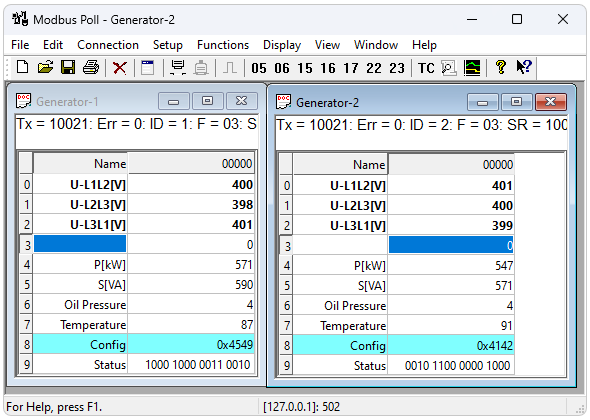

- Modbus server simulator mac os#
- Modbus server simulator serial#
- Modbus server simulator full#
- Modbus server simulator license#
The license of libmodbus is LGPL v3 and the licence of programs in the tests directory is GPL v3. This library is written in C and supports RTU (serial) and TCP (Ethernet) communications.

Modbus server simulator mac os#
Mbserver is FREEWARE an out-process ActiveX automation server intended to communicate with PLCs or other industrial equipment that use Modbus (RTU/ASCII) protocol or Modbus TCP protocol.Ī Modbus library for Linux, Mac OS X, FreeBSD, QNX and Win32 A free software library to send/receive data according to the Modbus protocol. For the extensive list of all currently supported features please refer to that site. ModLink is a set of native VCL components that allows you to integrate the ability of communication via Modbus protocol over a variety of networks into your applications created using Borland Delphi.

Or application information found on that site. Imply endorsement of the site by the Modbus Organization or imply approval of any content, recommendation Provide these links to you as a convenience only, and the inclusion of any link does not Site or any link contained in a linked site, or any changes or updates to such sites. Not under the control of the Modbus Organization and we are not responsible for the contents of any linked The following links to third party sites will let you leave this site. Of Modbus devices can establish their conformance with Modbus specifications. Read about the Modbus Conformance Test Program, through which suppliers Learn about the valuable resources available on the Modbus Organization Modbus-TCP Toolkit,įree to corporate members and also available to purchase.

Modbus server simulator full#
Once again, there are devices that exhibit # both forms of behavior:: # block = ModbusSparseDataBlock( ) # - # run the server you want # - # Tcp: StartTcpServer ( context, identity = identity, address = ( "", 5020 )) # TCP with different framer # StartTcpServer(context, identity=identity, # framer=ModbusRtuFramer, address=("0.0.0.0", 5020)) # TLS # StartTlsServer(context, identity=identity, # certfile="server.crt", keyfile="server.key", password="pwd", # address=("0.0.0.0", 8020)) # Tls and force require client"s certificate for TLS full handshake: # StartTlsServer(context, identity=identity, # certfile="server.crt", keyfile="server.key", password="pwd", reqclicert=True, # address=("0.0.0.0", 8020)) # Udp: # StartUdpServer(context, identity=identity, address=("0.0.0.0", 5020)) # socat -d -d PTY,link=/tmp/ptyp0,raw,echo=0,ispeed=9600 PTY, # link=/tmp/ttyp0,raw,echo=0,ospeed=9600 # Ascii: # StartSerialServer(context, identity=identity, # port="/dev/ttyp0", timeout=1) # RTU: # StartSerialServer(context, framer=ModbusRtuFramer, identity=identity, # port="/tmp/ttyp0", timeout=.Download the current versions of Modbus specifications and implementation guides. The difference is that the sequential has no gaps in # the data while the sparse can. This is # because many devices exhibit this kind of behavior (but not all):: # block = ModbusSequentialDataBlock(0x00, *0xff) # Continuing, you can choose to use a sequential or a sparse DataBlock in # your data context. DEBUG ) def run_server (): """Run server.""" # - # initialize your data store # - # The datastores only respond to the addresses that they are initialized to # Therefore, if you initialize a DataBlock to addresses of 0x00 to 0xFF, a # request to 0x100 will respond with an invalid address exception. basicConfig ( format = FORMAT ) log = logging. What follows is an example of its use: """ import logging # from pymodbus.datastore import ModbusSparseDataBlock from pymodbus.datastore import ( ModbusSequentialDataBlock, ModbusServerContext, ModbusSlaveContext, ) # from import StartTlsServer # from import StartUdpServer # from import StartSerialServer from vice import ModbusDeviceIdentification from import StartTcpServer # - # import the various server implementations # - # from pymodbus.version import version # from ansaction import ModbusRtuFramer, ModbusBinaryFramer # - # configure the service logging # - # FORMAT = ( " %(asctime)-15s %(threadName)-15s " " %(levelname)-8s %(module)-15s : %(lineno)-8s %(message)s " ) logging. This is helpful in constrained or old environments where using twisted is just not feasible.
Modbus server simulator serial#
The synchronous server is implemented in pure python without any third party libraries (unless you need to use the serial protocols which require pyserial). #!/usr/bin/env python3 """Pymodbus Synchronous Server Example.


 0 kommentar(er)
0 kommentar(er)
